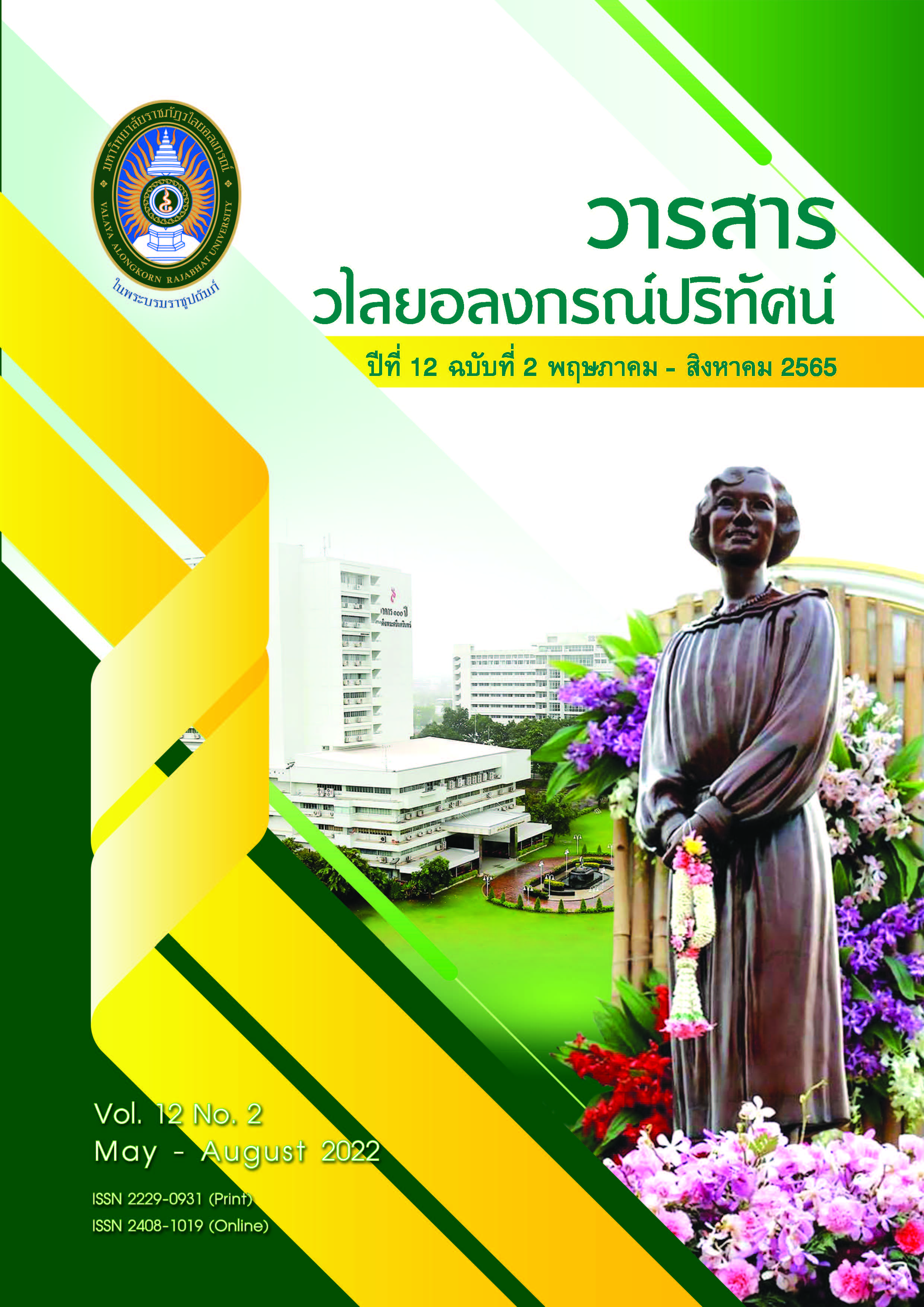เรื่องเล่าความสำเร็จการจัดการแหล่งเที่ยวเชิงเกษตรเพื่อความยั่งยืนด้วยหลักปรัชญาของเศรษฐกิจพอเพียง ไร่รื่นรมย์ เกษตรอินทรีย์ อำเภอเทิง จังหวัดเชียงราย
คำสำคัญ:
ความสำเร็จ, การจัดการการท่องเที่ยวเชิงเกษตร, ทฤษฎีเศรษฐกิจพอเพียง, เกษตรอินทรีย์บทคัดย่อ
การวิจัยครั้งนี้มีวัตถุประสงค์ เพื่อค้นหาความสำเร็จของการจัดการแหล่งท่องเที่ยวเชิงเกษตรเพื่อความยั่งยืนด้วยหลักปรัชญาเศรษฐกิจพอเพียง ไร่รื่นรมย์ เกษตรอินทรีย์ อำเภอเทิง จังหวัดเชียงราย ผู้ให้ข้อมูลหลัก คือ คุณศิริวิมล กิตะพาณิชย์ ผู้ก่อตั้งไร่รื่นรมย์ และพนักงานผู้มีส่วนเกี่ยวข้องในการจัดการไร่รื่นรมย์ 7 คน ใช้วิธีการวิจัยเชิงคุณภาพ ด้วยวิธีวิทยาการศึกษาประวัติชีวิตและเรื่องเล่า ใช้แบบสัมภาษณ์แบบกึ่งโครงสร้าง และการสังเกตแบบไม่มีส่วนร่วม
จากการวิจัยพบว่า ตลอดช่วงชีวิตวัยเด็กจนจบการศึกษาในคณะนิเทศศาสตร์ ของ คุณศิริวิมล กิตะพาณิชย์ ซึ่งก่อนหน้านี้ไม่เคยได้ทำการเกษตรมาก่อน พิสูจน์ตัวเองด้วยการเรียนรู้ การเป็นเกษตรกรอยู่ในโครงการ 1 ไร่ 1 แสน ทำให้เกิดความสนใจศึกษาเรียนรู้แนวคิดเศรษฐกิจพอเพียง ซึ่งเป็นจุดเริ่มต้นของ “ไร่รื่นรมย์” ตลอดระยะเวลาการจัดการไร่รื่นรมย์ ยึดเป็นแนวทาง
ในการดำเนินไร่รื่นรมย์คือ แนวคิดปรัชญาเศรษฐกิจพอเพียง ประกอบด้วย 3 ห่วง 2 เงื่อนไข โดยมี
เจตนารมณ์ให้เป็นเกษตรสร้างสรรค์ เน้นทำให้สนุก ทำให้น่าเรียนรู้ สื่อสารเข้าใจง่าย เข้าใจลึกซึ้ง และแปรรูปนอกกรอบ โดยมีการเผยแพร่ แบ่งปัน และขยายแนวคิดเศรษฐกิจพอเพียงสู่เกษตรสร้างสรรค์ ให้แก่ ชุมชน และผู้ที่สนใจ
คุณศิริวิมล กิตะพาณิชย์ประสบความสำเร็จในการเป็นผู้พัฒนาและจัดการพื้นที่เกษตร ให้เป็นแหล่งท่องเที่ยวเกษตรเชิงสร้างสรรค์ ภายใต้แนวคิด กิน อยู่ รู้ นอน มีการสร้างกิจกรรมการเรียนรู้เศรษฐกิจพอเพียงขึ้นในรูปแบบฐานการเรียนรู้ การจัดการด้านแหล่งท่องเที่ยว การตลาด นักท่องเที่ยวกระบวนการกิจกรรม และการบริการการท่องเที่ยว ตามองค์ประกอบการท่องเที่ยวเชิงเกษตรทำให้คุณศิริวิมล กิตะพาณิชย์ ได้รับรางวัล สตรีผู้นำธุรกิจ อนุรักษ์โลกตัวอย่าง จากสหพันธ์สมาคมสตรี นักธุรกิจและวิชาชีพแห่งประเทศไทย ในพระบรมราชินูปถัมภ์ ประจำปี 2561
เอกสารอ้างอิง
คมพล สุวรรณกูฏ, กนกวรรณ เบญจาทิกุล และณิชาภา เจริญรูป. (2564). รูปแบบการจัดการการท่องเที่ยวเชิงเกษตรในจังหวัดระยอง และจันทบุรี. วารสารวิจัยรำไพพรรณี. 15(1), 52-58.
ณัฏฐพงษ์ ฉายแสงประทีป. (2557). รูปแบบและกระบวนการดำเนินธุรกิจการท่องเที่ยวเชิงเกษตร. วารสารวิชาการ Veridian E-Journal. 7(3), 310-321
เทพกร ณ สงขลา. (2554). ความสัมพันธ์ระหว่างรูปแบบกิจกรรมการทองเที่ยวเชิงเกษตรและการใชทรัพยากรเกษตรของ ชุมชน : กรณีศึกษาท่องเที่ยวเชิงเกษตรช้างกลาง จังหวัดนครศรีธรรมราช. วารสารวิจัยวิทยาการจัดการและสารสนเทศศาสตร์. 6(2), 1-13.
เทพกร ณ สงขลา. (2556). รูปแบบการจัดการทรัพยากรการเกษตรเพื่อการทองเที่ยวเชิงเกษตรที่ยั่งยืนในอำเภอช้างกลาง จังหวัดนครศรีธรรมราช. ปริญญาดุษฎีบัณฑิต สาขาวิชาการจัดการทรัพยากรเกษตรเขตร้อน มหาวิทยาลัยสงขลานครินทร์.
วราภรณ์ ลิ้มเปรมวัฒนา และดาริกา กูลแก้ว. (2561). องค์ประกอบของปัจจัยการตลาดและพฤติกรรมของนักท่องเที่ยวที่เดินทางมาท่องเที่ยวตลาดน้ำคลองลัดมะยม. วารสารกระแสวัฒนธรรม. 19(36), 41-50
ศรัญญา ตรีทศ. (2558). การส่งเสริมการท่องเที่ยวเชิงเกษตร อำเภอเขาค้อ จังหวัดเพชรบูรณ์. วิทยานิพนธ์เทคโนโลยีการเกษตรมหาบัณฑิต มหาวิทยาลัยราชภัฏเพชรบูรณ์.
สุจิตราภรณ์ จุสปาโล. (2558). การจัดการท่องเที่ยวเชิงเกษตรโดยชุมชนบ้านบางเหรียงใต้ อำเภอควนเนียง จังหวัดสงขลา. วารสารมหาวิทยาลัยราชภัฏมหาสารคาม (มนุษย์ศาสตร์และสังคมศาสตร์). 9(1), 113-124.
สำนักงานคณะกรรมการพัฒนาการเศรษฐกิจและสังคมแห่งชาติ. (2560). แผนพัฒนาเศรษฐกิจและสังคมของประเทศ ฉบับที่ 12. [ออนไลน์], เข้าถึงได้จาก https://www.nesdb.go.th/ewt_dl_link.php?nid=6422 (2564, 8 กรกฎาคม)
Jirawongsy, N. (2016). The Impact of Storytelling on Luxury Value Perception of a Brand Goyard Case Study. Panyapiwat Journal. 8(12), 64-73.
Jermsittiparsert, K., Joemsittiprasert, W. & Phonwattana, S. (2019). Mediating Role of Sustainability Capability in Determining Sustainable Supply Chain Management in Tourism Industry of Thailand. International Journal Supply Chain Management. 8(3), 47-58.
Wolfe, K., & Bullen, G. (2009). Agritourism, Your Way: A How-to Guide for Successful Agritourism Enterprises. [Online], Available: http://www.clemson.edu. (2021, 12 July).
ดาวน์โหลด
เผยแพร่แล้ว
รูปแบบการอ้างอิง
ฉบับ
ประเภทบทความ
สัญญาอนุญาต
ลิขสิทธิ์ (c) 2022 ภัทราพร ทิพย์มงคล, สันติธร ภูริภักดี

อนุญาตภายใต้เงื่อนไข Creative Commons Attribution-NonCommercial-NoDerivatives 4.0 International License.
ข้อความที่ปรากฏในบทความแต่ละเรื่องในวารสารวไลยอลงกรณ์ปริทัศน์ เป็นความคิดเห็นของผู้นิพนธ์แต่ละท่าน มิใช่เป็นทัศนะและมิใช่ความรับผิดชอบของกองบรรณาธิการจัดทำวารสาร และ
มหาวิทยาลัยราชภัฏวไลยอลงกรณ์ ในพระบรมราชูปถัมภ์


